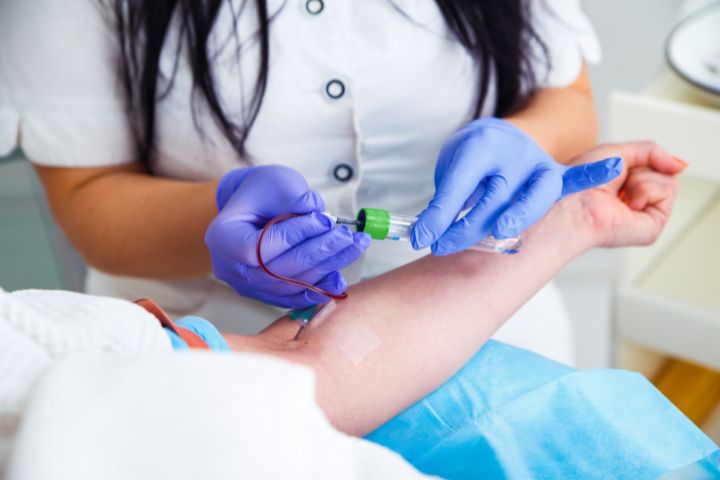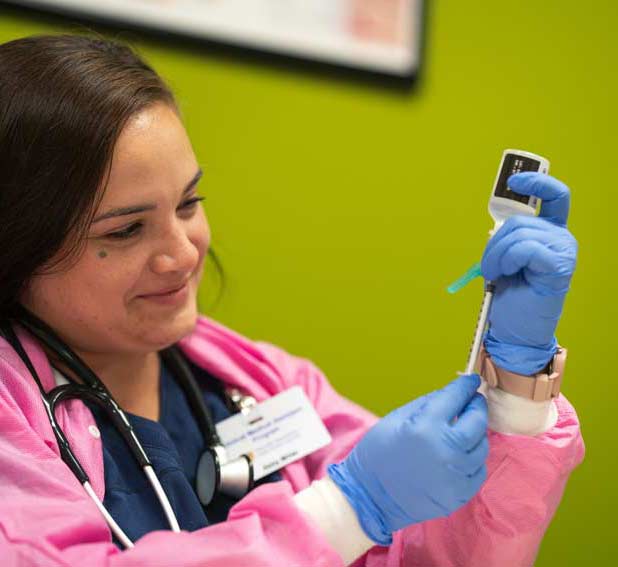Phlebotomy Courses Near Me: Which One Is Best?
Phlebotomy Courses Near Me: Which One Is Best?
Blog Article
The Path to Certification: Comprehending the Phlebotomy Training Program Journey and Its Importance
As you consider the path to certification in phlebotomy, it's important to understand the role you'll play in healthcare. Your training will certainly cover essential abilities, from blood collection strategies to patient communication. Each element of the program prepares you for the difficulties in advance. What specifically does the trip involve, and why is certification so crucial for your future occupation? Allow's explore these concerns better.

The Role of Phlebotomists in Medical Care
Phlebotomists play an essential duty in the healthcare system, working as the crucial link between patients and necessary diagnostic testing. You'll perform blood draws, ensuring examples are gathered properly and safely. Your competence helps in identifying clinical problems, keeping an eye on health, and leading treatment decisions.
In your day-to-day interactions, you'll require to establish depend on with individuals, making them really feel comfortable during what could be a stressful experience. You are accountable for classifying and managing examples carefully to stop contamination or mistakes, which could influence examination outcomes.
Beyond this, you'll commonly function alongside doctors and nurses, interacting important details concerning people' problems. By understanding your abilities, you add meaningfully to client care, making you a vital component of the clinical group.
Introduction of Phlebotomy Training Programs
When checking out phlebotomy training programs, you'll discover different types designed to fit different timetables and discovering styles. Each program assists you develop important skills like blood collection and patient communication. Recognizing these alternatives is crucial to selecting the ideal path for your profession.
Sorts Of Training Programs
Numerous types of training programs are readily available for those looking to become efficient in phlebotomy. Additionally, some health centers and clinics use on-the-job training programs, giving useful experience while you learn. Whatever course you choose, each program aims to furnish you with the essential skills for a successful phlebotomy job.

Key Skills Established
Understanding phlebotomy needs a set of crucial abilities that are developed via extensive training programs. Additionally, communication abilities are fundamental; you'll need to interact with patients, clarify treatments, and put them at convenience. Each of these skills is crucial for your success as a certified phlebotomist, making you a useful property in any kind of healthcare setup.
Key Components of a Phlebotomy Program
In a phlebotomy program, you'll focus on necessary subjects that lay the foundation for your future profession. You'll engage in hands-on training that allows you to apply what you have actually discovered in real-world settings. Both the core curriculum and useful experience are important for your success as a phlebotomist.
Curriculum Introduction
While seeking a phlebotomy training course, you'll encounter a curriculum designed to outfit you with basic abilities and understanding. Phlebotomy Courses Near Me. This curriculum normally consists of anatomy and physiology, concentrating on the circulatory system and comprehending blood elements. You'll likewise learn around different sorts of blood collection methods, consisting of venipuncture and capillary leak methods
In addition, infection control and safety and security protocols are important parts, ensuring you know just how to keep a sterile environment. You'll study patient interaction, highlighting interaction and empathy, which are important for easing person stress and anxiety. Finally, moral and lawful considerations will be addressed, preparing you for real-world obligations. This fundamental knowledge will certainly allow you to succeed as a phlebotomist and give top quality care in medical setups.
Hands-On Training Experience
Obtaining hands-on experience is an indispensable part of your phlebotomy training course. This useful training allows you to apply what you've found out in a real-world setting, boosting your abilities and confidence. Phlebotomy Courses Near Me.
Furthermore, you'll get the chance to communicate with clients, which is important for creating your interaction abilities. This combination of technological effectiveness and interpersonal abilities is critical for your success as a certified Phlebotomy school phlebotomist. Eventually, hands-on training is where concept fulfills practice, solidifying your understanding and preparedness for certification.
Qualification and Licensing Needs
Before you can start your job in phlebotomy, it is vital to recognize the certification and licensing needs that differ by state. A lot of states call for phlebotomists to hold an accreditation from an acknowledged organization, such as the National Phlebotomy Organization or the American Society for Medical Pathology. These qualifications generally entail passing a test that examines your knowledge and skills in the field.
In addition to accreditation, some states have certain licensing requirements. You might need to complete a certain variety of hours in clinical method, submit evidence of training, or go through a history check. It is essential to investigate your state's guidelines to make certain you meet all necessary requirements.
Staying informed about these demands not only aids you protect a setting however likewise enhances your integrity as a professional. By satisfying these requirements, you'll be well on your means to an effective career in phlebotomy.
Hands-On Training and Practical Experience
Hands-on training and sensible experience are crucial components of your phlebotomy education and learning, as they allow you to use academic knowledge in real-world situations. Throughout your training, you'll involve in supervised venipuncture, learn appropriate techniques, and end up being accustomed to different blood collection tools. This direct participation is crucial for constructing your confidence and sharpening your abilities.
You'll work very closely with experienced experts who can assist you through the subtleties of client communication and sample handling. Each practice not just strengthens your understanding yet also prepares you for the fast-paced atmosphere of healthcare settings.
In addition, lots of programs incorporate clinical turnings, allowing you to experience varied setups, from hospitals to outpatient centers. This exposure helps you adapt to different obstacles and patient demands, ensuring you're well-prepared for your future role. Welcome these possibilities, as they're important to coming to be an experienced and thoughtful phlebotomist.
Obstacles Dealt With During Training
While acquiring hands-on experience is necessary, it's essential to recognize the obstacles that can develop throughout your phlebotomy training. You may come across anxiety when carrying out treatments on real people, especially if you're brand-new to the atmosphere. The stress to get whatever right can be overwhelming. In addition, grasping the abilities needed for blood attracts takes method; you might have problem with technique at first.
Time administration can also be a difficulty, as harmonizing theory, practical sessions, and individual dedications can feel challenging. You might face varying finding out speeds amongst your peers, causing sensations of insecurity if you think you're dropping behind. Adapting to the various personalities of instructors can be challenging, as each might have a special training design.
Acknowledging these challenges at an early stage can prepare you for success and help you develop strength throughout your training journey.
Career Opportunities After Qualification

As you acquire experience, you could even think about specializing in areas like pediatric or geriatric phlebotomy, accommodating certain person requirements. Some phlebotomists select to advance their careers by ending up being laboratory specialists or going after additional education and learning in medical care areas.
Additionally, your certification can lead to roles in training or monitoring brand-new phlebotomists, permitting you to share your understanding. With the medical care market consistently growing, your skills will constantly be in need, leading the way for a steady and fulfilling occupation. Accept the chances awaiting you!
Regularly Asked Concerns
What Is the Typical Period of a Phlebotomy Educating Program?
Phlebotomy training programs generally last around 4 to 8 weeks. You'll involve in hands-on technique, classroom direction, and online learning. Completing this training prepares you for qualification and a gratifying occupation in medical care.
Are Online Phlebotomy Courses Available?
Yes, online phlebotomy courses are offered. They use versatility and ease, permitting you to study at your own rate. Simply verify the program is recognized to meet accreditation demands and acquire useful skills for your career.
How Much Does Phlebotomy Training Normally Expense?
Phlebotomy training usually costs between $700 and $2,500, depending on the program and area. You need to think about elements like course length, included materials, and hands-on experience when choosing the right training for you.
What Are Common Requirements for Phlebotomy Training?
Common requirements for phlebotomy training typically include a secondary school diploma or GED, booster shots, and a history check. Some programs may likewise call for fundamental healthcare knowledge or qualifications, guaranteeing you're planned for hands-on training.
Can I Work While Completing My Phlebotomy Training?
Yes, you can function while completing your phlebotomy training. Numerous trainees balance work with their researches, however make sure to handle your time efficiently to assure you fulfill both work and training commitments effectively.
Report this page